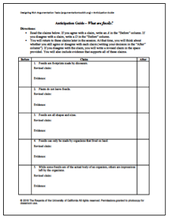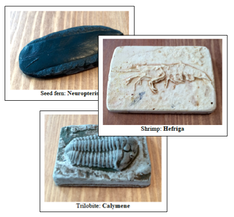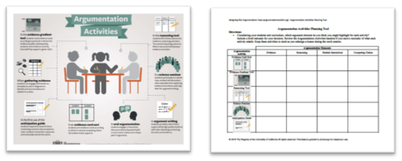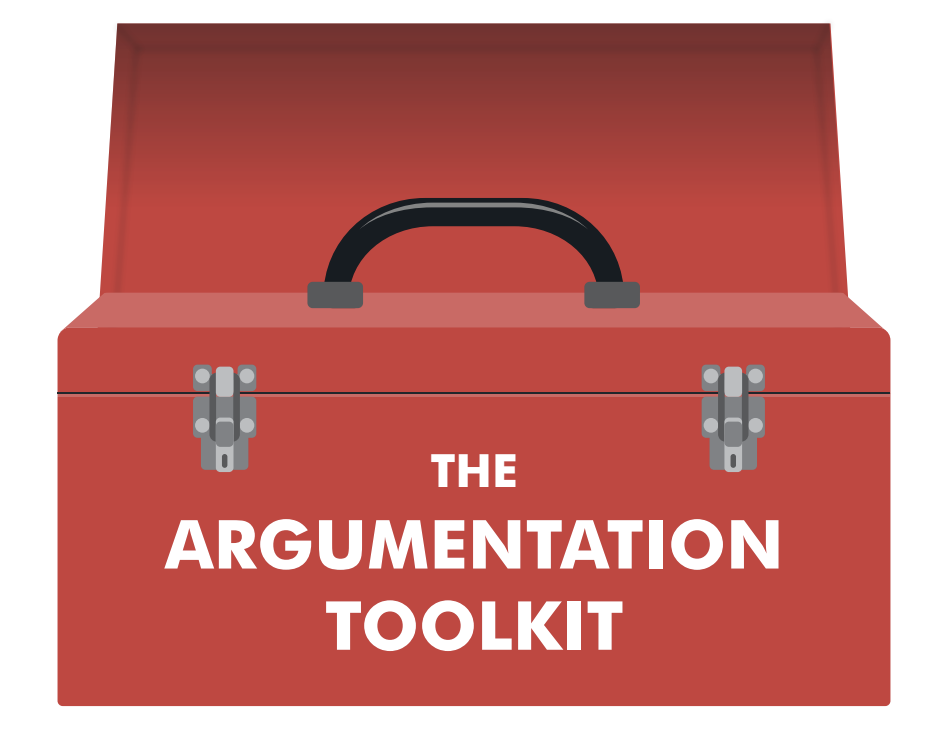How can you support students to revise their thinking given new evidence?
Advanced – Designing Rich Tasks, Session 3
Session Goals:

- Teachers will be introduced to key criteria and other things to consider when designing rich argumentation tasks.
- Teachers will consider how various instructional activities (e.g. Evidence Gradient Tool, Anticipation Guide) align with the key criteria for rich argumentation tasks.
- Teachers will be introduced to the Anticipation Guide as an instructional tool that supports students in tracking their thinking, and revising claims given new evidence.
- Teachers will consider the ways that different instructional activities can support the four areas of argumentation in which students need extra support.
- Teachers will design a new lesson or revise an existing lesson to integrate a rich argumentation task into their science instruction.
- Teachers will identify areas of argumentation that are challenging for their students.
*Note: These final two goals are only applicable if the module is implemented as multiple sessions
Session Slides:
Advanced Designing Rich Tasks, Session 3 PDF
Agenda:
*Extension Discussion – Try it with your students!
- Video & Discussion: Using an anticipation guide
- Activity: Anticipation guide Part 1
- Activity: Examining new evidence
- Activity: Anticipation guide Part 2
- Connection back to design criteria
*Extension – Preparation for work session
*Extension Discussion – Try it with your students!
Share your experience:
- Share the argumentation task you developed to focus on evaluating the quality of evidence, as well as any student artifacts you may have.
Discussion Questions:
- What went well with the argumentation task? Why do you think it went well?
- What was challenging with the argumentation task? Why do you think it was challenging?
1. Video & Discussion: Using an anticipation guide
View a reminder about the criteria for designing rich argumentation tasks.
Watch the video below, which provides an introduction to the anticipation guide.
Discussion Questions:
- In what ways does the anticipation guide mirror the work of scientists?
- How might an anticipation guide support deeper learning for students?
2. Activity: Anticipation guide Part 1
The task:
- Read each of the claims in the anticipation guide and check whether or not you agree with them in the “Before” column.
- When you are done, share your current thinking with a partner. Remember, it is okay to be unsure at this point because you will be able to revise your thinking once you examine new evidence.

3. Activity: Examining new evidence
The task:

- Work in pairs or small groups to examine the Fossil Evidence Cards, keeping in mind the claims from the anticipation guide.
- When you are done, discuss how your understanding of fossils has changed, or deepened after examining the cards.
4. Activity: Anticipation guide Part 2

The task:
- Re-read each claim, check whether or not you agree with it in the “After” column, and revise the claim (if needed) given the fossil evidence just examined.
- Make sure to add evidence in support of each claim, regardless of whether or not you revised the claim.
Discussion Questions:
- Were there any claims that you found difficult to revise? Why?
- How can you envision your students engaging in this activity? What would work well? What challenges would they have?
5. Connection back to design criteria
View a reminder about the criteria for designing rich argumentation tasks.
Think-pair-share:
- In the activity you just completed, which design criteria do you think the argumentation task aligned with well?
- Which design criteria do you think the argumentation task did not align with?
- How could you redesign the argumentation task to better align?
* Extension – Preparation for work session
The task:
- Bring a lesson with an argumentation task from existing curriculum that you would like to revise. This could be the lesson you examined for the Extension Activity of Session #1.
- Before the next meeting, look through the planning tool and mark which argumentation element you would highlight for each activity
- Keep these activities in mind since you could incorporate one into the lesson you choose to revise.

View Other Sessions
Advanced Designing Rich Tasks Agenda
| Session Name | Description | Length |
|---|---|---|
| Session #1: What design criteria support rich argumentation tasks? | This session introduces four criteria and other considerations when designing rich argumentation tasks. | 45 minutes |
| Session #2: How can you support students to evaluate the quality of evidence? | This session incorporates an Evidence Gradient Tool as a means to support students in evaluating the quality of evidence. | 45 minutes |
| Session #3: How can you support students to revise their thinking given new evidence? | This session uses an Anticipation Guide to explore ways to support students in revising their thinking given new evidence. | 45 minutes |
| Session #4: Work session – designing a rich argumentation task | This session provides teachers with work time to develop or revise a lesson that includes a rich argumentation task. | 45 minutes |

